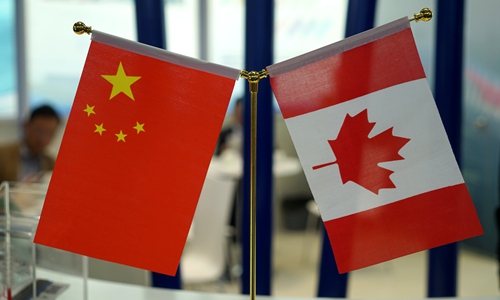HOME >> OPINION
Fairness in Meng’s case can help bring China-Canada ties back on track
Source:Global Times Published: 2019/12/3 23:08:40

Photo: IC
The arrest of Meng Wanzhou, chief financial officer of Chinese tech giant Huawei, in December 2018, was a turning point in China-Canada relations, which plummeted after the arrest. The time-consuming case touches the nerve of Chinese and Canadian people, and the political fraternity in both countries. The longer the standoff lasts, the harder it will be for relations to be restored to normalcy.After US President Donald Trump signed on Wednesday the so-called Hong Kong Human Rights and Democracy Act, some Canadian senators followed up by hoping "the Conservatives will be able to team up with other parties to hold Commons hearings on Hong Kong." They wished to make a Canadian version of the US Hong Kong bill and "enact Magnitsky-style sanctions" against Chinese mainland and Hong Kong officials responsible for so-called human rights violations.
This shows how Canada's lawmakers lack independence when dealing with China-related topics, as they blindly follow the US.
In its attempt to copy the US, Canada has repeatedly made bad calls in trying to bring a thaw in relations with China, despite the fact that tensions with China do not augur well for Canada's economic development.
Though both the Conservative Party and Canadian Prime Minister Justin Trudeau's Liberal Party have shown tough stances toward China, and some Conservatives have attacked Trudeau for being soft on the Asian power, the mainstream attitude toward China within the two parties in the country may not be what media have presented.
Trudeau once said he was unaware of plans to arrest Meng. Obviously he lied. Reports indicated that members of Trudeau's Liberal Party had tried to persuade him not to take over the hot potato, but he declined and stubbornly chose to stand with the US in this case. As a result, policies toward China took a beating during his first tenure and are a big reason for him to lose support in the election campaign for the second term.
The Conservative Party said it would be tougher on China, but if it wins power, it wouldn't necessarily do what it said. In this context, Conservatives' accusation against Trudeau is more like a strategy to achieve their own political goals by creating trouble for the prime minister over China-related issues.
Both parties' tough stances on China are actually aimed at getting themselves closer to the US to reap political benefits.
Meng's case has given the US an opportunity to crack down on Huawei and to contain China, but US pernicious propaganda against China has gradually lost its effect. Some important allies of the US, including Germany, have shown a different attitude toward Huawei. Canada won't soon change its attitude toward the Chinese tech company as it follows the US too closely, but it will have to make a choice as the first phase of Meng's extradition proceedings is set to begin in January 2020.
Against the backdrop, it is important for us to continue positive publicity about China and Huawei to counter the effect of lies spread by anti-China politicians from the US and Canada.
On the other hand, we should expand trade connections with Canada, and use trade, people-to-people contacts as well as educational interactions to promote China's real image among Canadians. After laying such a foundation of public opinion, the two countries can be persuaded to meet each other halfway.
Because of Meng's case, Canada was drawn into the vortex of US-launched trade war against China, and had its economy affected. Hence, bringing China-Canada ties back on track is important for Canada.
In contrast to what Trudeau said that he had "spent the last four years making things better" citing increased job creation and lowest unemployment rates in the country's history, only 22 percent of Canadians showed strong confidence in his ability to create conditions for economic prosperity, BNN Bloomberg reported, citing a poll by Nanos Research Groups for Bloomberg News.
Cooperation with China would be a good way for Trudeau to bring economic prosperity to Canadians as the two countries are highly interdependent in trade with vast potential in trade exchanges. This is what Canadian politicians cannot overlook.
Faced with lack of public trust and dissenting voices from within his Liberal Party and the opposition, Trudeau will have to figure out how to gain more support and govern better in his second term. As China-US trade tensions are slowly mitigating, putting China-Canada ties back on track will not only be a good choice for Trudeau but also be beneficial for his country.
The opposition attempts to use Hong Kong issue to sow discord in Canadian society but it won't affect the big trend of how Canadian government should handle its relations with China.
The Chinese government has shown sincerity and goodwill in terms of Meng's case, and Chinese people are looking forward to Canada's wise decisions. China and Canada are interdependent in trade, and the two countries should jointly promote globalization to realize win-win cooperation that is in line with their common interests.
The article was compiled by Global Times reporter Xu Hailin based on an interview with Yao Peng, managing deputy director of the Canadian Studies Center of the Chinese Academy of Social Sciences. opinion@globaltimes.com.cn
RELATED ARTICLES:
Posted in: VIEWPOINT